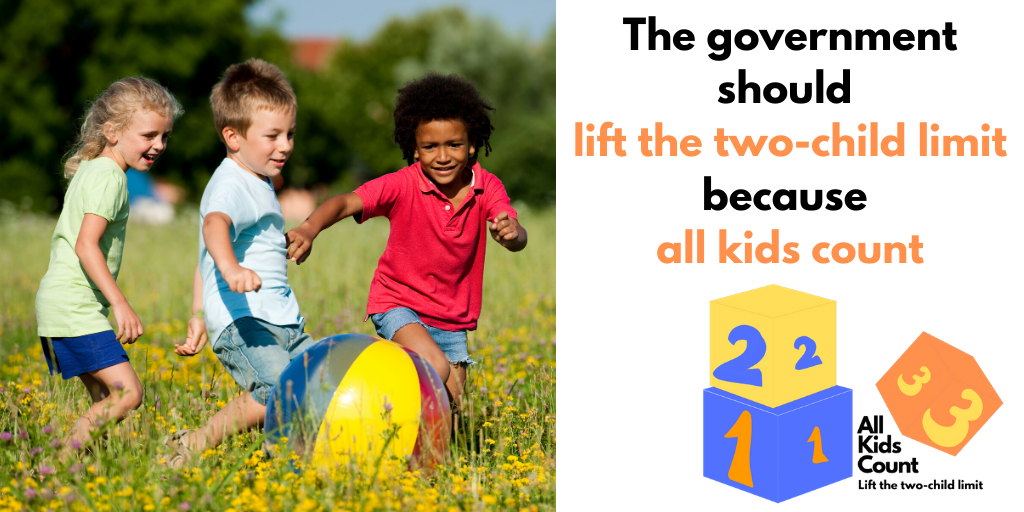Two Child Policy Open Letter
OPFS and over 30 other organisations wrote an open letter to the Times about the #TwoChildLimit.
Here in Scotland, we believe that every child should have the best start in life. And yet the two-child limit denies families the support they need from our social security system when they experience tough times, trapping kids in poverty. It’s right to support families when they need it most. The UK government should lift the two-child limit and help all children to thrive.
17/07/2020
News
#AllKidsCount

- Satwat Rehmen, Director OPFS
Open Letter
Sir,
New government statistics show 243,000 households have been hit by the two-child limit, which restricts support for children in low-income families pushing many into poverty. The pandemic has highlighted how problematic the policy is: families couldn’t have foreseen such economic turmoil when they had their children, and should be able to rely on the social security system to support all their children in a crisis.
We all want children to have the best start in life, filled with opportunity and hope. Every child needs access to free health care, a good education and a childhood free from poverty. We wouldn’t turn away a sick child from hospital, yet the two-child limit denies families the support they need from our social security system in tough times. The policy particularly affects some faith groups and minority ethnic communities, as well as single parent families.
Last week the Chancellor said that no one will be left without hope. But poverty diminishes hope. As we start to recover from one of the most difficult periods in modern history, we must ensure that children in poverty are not left behind. The government should lift the two-child limit to help all children thrive.
Ruth Erblich, Social Welfare Advisor, AICS;
The Rt Revd Paul Butler, Bishop of Durham;
Emma Goldie, Head of Casework and Advocacy, Body & Soul;
Ann Furedi, Chief Executive, BPAS;
Andy McClenaghan, Public Affairs and Communications Officer, British Association of Social Workers Northern Ireland;
Philip McCarthy, Chief Executive Officer, Caritas Social Action Network;
Alison Garnham, Chief Executive, Child Poverty Action Group;
Kathy Evans, CEO, Children England;
Azmina Siddique, Policy and Research Manager, The Children’s Society;
Sam Smethers, CEO, Fawcett Society;
Dominic Williams, CEO, Frontline Debt Advice;
Victoria Benson, Chief Executive Officer, Gingerbread;
Graham Whitham, Director, Greater Manchester Poverty Action;
Sabine Goodwin, Independent Food Aid Network;
David Schleider, Trustee, Jewish Community Council of Gateshead;
Jess McQuail, Director, Just Fair;
Paul Farmer, Chief Executive, Mind;
Craig Samuel, Scotland Representative, NAWRA;
Jane Streather, Chair, North East Child Poverty Commission;
Satwat Rehman, CEO, One Parent Families Scotland;
Maurice Wren, Chief Executive, Refugee Council;
Gill Walton, Chief Executive, The Royal College of Midwives;
Suzanne Jacob, CEO, SafeLives;
Dr Marsha Scott, Chief Executive, Scottish Women’s Aid;
Dr Nicola Sharp-Jeffs, Chief Executive, Surviving Economic Abuse;
Emma Revie, Chief Executive, The Trussell Trust;
Kate Bell, Head of Rights, International, Social and Economics Department, the TUC;
Thomas Lawson, CEO, Turn2us;
Dave Prentis, General Secretary, UNISON;
Lucy Hadley, Head of Policy & Campaigns, Women’s Aid Federation of England;
Dr Mary-Ann Stephenson, Director, UK Women’s Budget Group;
Jane van Zyl, Chief Executive, Working Families;
Anela Anwar, Chief Executive, Z2K.
- Single parent,